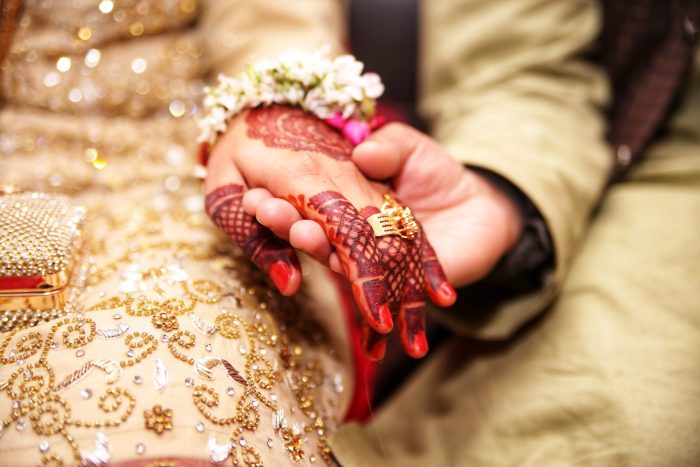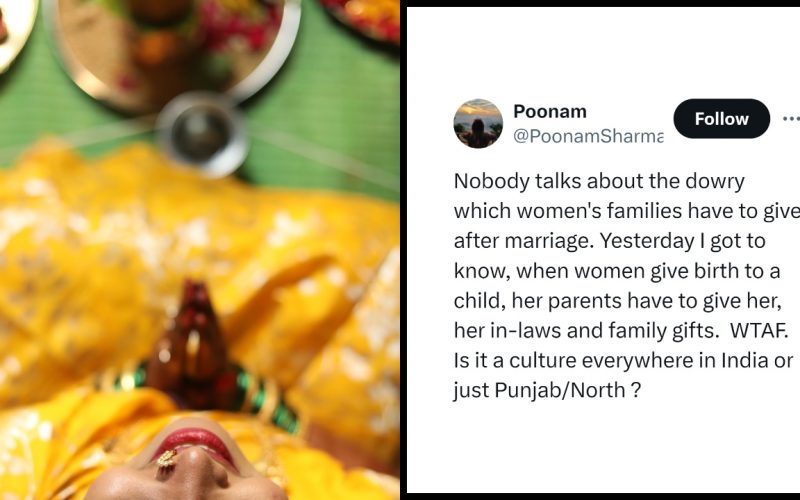Despite dowry being illegal in India under the Dowry Prohibition Act of 1961, a majority of us are aware of how prevalent the practice is even today. The Dowry Prohibition Act of 1961 aims to prevent the giving or receiving of dowry in marriages and to penalize those who demand, give, or receive dowry. While many families are absolutely not low-key about the exchange of dowry, there are many others who try to pass off ‘dowry’ as ‘gifts’. However, what a lot of people might not know is that the practice of giving and taking dowry does not end with the wedding. During the course of a couple’s marriage, the bride’s family (in most cases) is expected to keep giving ‘gifts’ to the groom’s family to ensure the bride’s future security.

This practice was highlighted on social media by a woman named Poonam Sharma who wrote that nobody really talks about the dowry that women’s families have to give to the groom’s family after marriage, especially when a child is born. The in-laws are given gifts from the woman’s side of the family.
Nobody talks about the dowry which women's families have to give after marriage. Yesterday I got to know, when women give birth to a child, her parents have to give her, her in-laws and family gifts. WTAF. Is it a culture everywhere in India or just Punjab/North ?
— Poonam (@PoonamSharma__) March 18, 2024
When she asked people online if this is a ritual that is only prevalent in North India, several people begged to differ. Turns out, in several states across north and south India, the practice of giving expensive gifts, cash, taking care of medical expenses, etc. is very much prevalent.
In certain states, the woman’s family have to gift her in-laws with gold jewellery. In others, they have to take full responsibility of the girl’s health, including medical expenses, when she is pregnant.
Here’s a look at some of the responses:
In MH as well, there are similar traditions but usually the recipient is the child and the father of the newborn. Also, every 4 years there is an additional month in the Marathi calendar, when the girl’s parents need to gift something ultra expensive to her husband 🤷🏻♂️🤦🏻♂️
— Anup Mankar (@anupmankar) March 18, 2024
Yup!! Punjabi here. gold jewelry for mil, sils, daughter, baby, clothes for all and expensive household things, and then all of it is put on display for the new father’s khandan by his mother. And all the aunties scrutinize each and everything right in the new mother’s face.
— Jugni – NO DMs (@SpandaAndShunya) March 18, 2024
In my family, the woman’s parents would also pay for all the medical expenses for childbirth too…
— Conrad Barwa (@ConradkBarwa) March 18, 2024
true, in my North Indian Haryanvi family, the expenses of childbirth like hospital admission, clothes, etc have to be paid by the maternal uncle (mama)
— Vaishnavi || वैष्णवी (@MVaish06) March 18, 2024
There are many instances of guy’s family not allowing girl’s family to see the child because they did not bear all the expenses.
— Asif Syed (@asiifsyed) March 19, 2024
Not just that. There is another custom called as mayra where the bride’s mother family gives gifts to mothers’ in laws the entire family.
— Chirag Barjatya (@chiragbarjatyaa) March 18, 2024

I’m natively from Rajasthan and it’s quite prevalent there. It’s followed shamelessly as a matter of boy’s family’s right exactly like dowry.
— Neeraj (@neerjain) March 18, 2024
Very mandatory in Tamilnadu .
— Shalin Maria Lawrence (@TheBluePen25) March 18, 2024
In MH as well, there are similar traditions but usually the recipient is the child and the father of the newborn. Also, every 4 years there is an additional month in the Marathi calendar, when the girl’s parents need to gift something ultra expensive to her husband 🤷🏻♂️🤦🏻♂️
— Anup Mankar (@anupmankar) March 18, 2024
There is a custom in Tamil Nadu that the parents of the bride need to spend in the first year as much as they spent for the marriage. Via gifts. Double dowry.
— Ideator Atom (@Ideator_Atom) March 18, 2024
It’s a must in Andhra Tradition .!
— Aishwarya V (@aish8vadlamani) March 18, 2024
Very true in Rajasthan too. If it’s a boy then expectations are higher like gold for the baby and their daughter plus clothes etc for the daughter’s in-laws. In fact, the same is expected on girl’s first teej/gangaur and some other such festivals after marriage.
— simping for wahaj 🥵 (@cine_viewss) March 18, 2024
In TN, the gift culture extends for first Diwali and every other festival. And yes, a woman’s delivery expense must be fully borne by the woman’s family, followed by giving gifts to the man and his family when she goes back with the kid.
— Priya (@Leafinthewheel) March 18, 2024
in Kerala, among Syrian Christians, we have to give gold chain, bangles, anklets minimum for the first child,
— Nonconformist (@smj2901) March 18, 2024
Parents of the lady have to pay for hospital, delivery expenses. Religious events post delivery (naming etc) have to be at the woman’s parent’s expense;
Hospital bills are sent to the Son in Law, if he is in a company that gives a reimbursement he’ll claim the bills and keep the… https://t.co/Io5LUb1QCb— Chinmayi Sripaada (@Chinmayi) March 18, 2024
The girl is sent back to her parents place peri-delivery so the expenses of the child birth and post delivery 6 months are borne by the girl’s family. God forbid it’s a second girl child requiring neonatal icu stay. The girl’s family will have to sell whatever remains post dowry https://t.co/UnDBd4KuHe
— Dr G (@idovoodoo_) March 18, 2024
When the woman is about to give birth and the first few months after birth,it’s her family that is supposed to take care of everything. Men and their families can’t even provide care for her and the newborn even though it’s their grandchild and will be given the man’s name smh https://t.co/jlP2BvqPib
— jungkook misser (@oikawasballs) March 18, 2024
How do you think we, as a society, can eradicate the practice of dowry in our country? Share with us!




